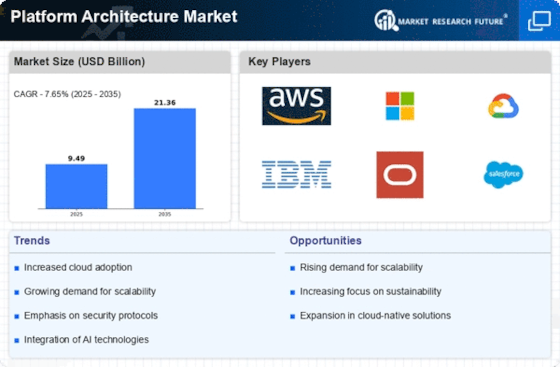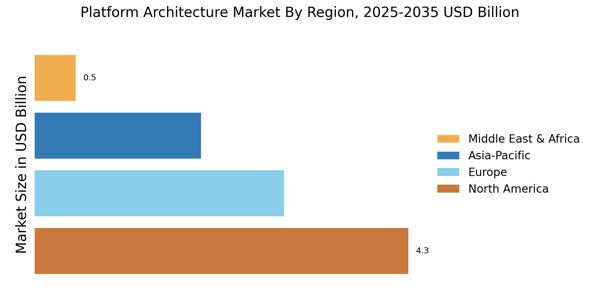Rising Demand for Scalability
The Platform Architecture Market is experiencing a notable increase in demand for scalable solutions. Organizations are increasingly seeking architectures that can adapt to fluctuating workloads and user demands. This trend is driven by the need for businesses to remain agile and responsive in a competitive landscape. According to recent data, the scalability aspect of platform architecture is projected to grow at a compound annual growth rate of approximately 15% over the next five years. Companies are investing in modular architectures that allow for easy expansion and integration of new technologies. This shift towards scalable solutions is likely to enhance operational efficiency and reduce costs, thereby positioning organizations favorably in the market.
Increased Focus on Interoperability
Interoperability is becoming a crucial driver in the Platform Architecture Market. As organizations adopt diverse technologies and platforms, the ability to integrate and communicate across systems is paramount. This need for seamless interoperability is pushing companies to invest in architectures that support open standards and APIs. Recent market analysis suggests that the interoperability segment is expected to grow by 20% in the coming years. This growth is indicative of a broader trend where businesses prioritize compatibility and integration capabilities to enhance operational efficiency. The emphasis on interoperability not only streamlines processes but also fosters innovation by enabling the integration of emerging technologies.
Growing Importance of Data Analytics
The Platform Architecture Market is increasingly influenced by the growing importance of data analytics. Organizations are recognizing the value of data-driven decision-making, which necessitates robust platform architectures capable of handling large volumes of data. The demand for analytics-driven platforms is projected to rise significantly, with estimates suggesting a growth rate of 18% over the next few years. This trend is prompting businesses to invest in architectures that support real-time data processing and advanced analytics capabilities. By leveraging data analytics, organizations can gain insights that drive strategic initiatives and improve customer experiences, thereby enhancing their competitive edge in the market.
Shift Towards Hybrid Cloud Solutions
The Platform Architecture Market is experiencing a marked shift towards hybrid cloud solutions. Organizations are increasingly adopting hybrid models that combine on-premises infrastructure with cloud services to optimize performance and cost. This trend is driven by the need for flexibility, scalability, and enhanced security. Recent data indicates that the hybrid cloud segment is expected to grow at a rate of 22% in the next few years. Companies are recognizing the advantages of hybrid architectures, which allow them to maintain control over sensitive data while leveraging the scalability of cloud resources. This shift is likely to redefine how organizations approach their platform architecture strategies.
Emergence of Microservices Architecture
The Platform Architecture Market is witnessing a significant shift towards microservices architecture. This architectural style promotes the development of applications as a suite of small, independent services that can be deployed and scaled independently. The adoption of microservices is driven by the need for faster deployment cycles and improved fault isolation. Recent studies indicate that organizations utilizing microservices report a 30% increase in deployment frequency. This trend is likely to continue as businesses seek to enhance their agility and responsiveness to market changes. Furthermore, the microservices approach facilitates better resource utilization, which is becoming increasingly critical in the current economic climate.

















